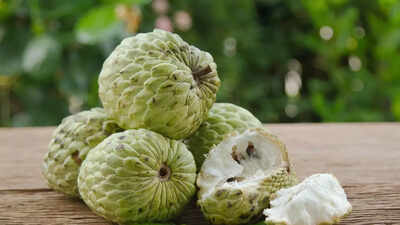Custard apple, scientifically known as Annona squamosa, is a tropical fruit prized for its sweet, creamy texture and impressive nutritional profile. Packed with vitamins, minerals, and antioxidants, it supports digestive health, strengthens immunity, and contributes to healthy skin and overall well-being. Despite its benefits, custard apple can cause side effects, particularly when eaten in large quantities or if certain parts of the fruit, like seeds or skin, are consumed. Overconsumption may lead to digestive issues, blood sugar fluctuations, allergic reactions, or toxicity from seeds. Understanding the potential risks and practising moderation allows you to enjoy custard apple safely while maximising its health benefits.
8 side effects of custard apple
A study published in ScienceDirect notes that overconsumption or improper preparation of the fruit can lead to potential side effects, including digestive issues, blood sugar fluctuations, allergic reactions, and toxicity from seeds. Therefore, it’s essential to consume custard apple in moderation and be aware of its preparation methods to fully enjoy its health benefits.1. Digestive issues from overconsumptionWhile custard apple is high in dietary fibre, which aids digestion, consuming it in large quantities can lead to digestive discomfort. Excessive intake may cause bloating, gas, or diarrhoea, particularly in individuals with sensitive stomachs or those unaccustomed to high-fibre diets. It’s advisable to consume custard apple in moderation to avoid these digestive issues. 2. Risk of weight gain due to high caloric contentCustard apple contains natural sugars and is relatively high in calories. Overindulgence in this fruit can contribute to weight gain, especially if not balanced with physical activity. Individuals monitoring their calorie intake should be mindful of portion sizes when consuming custard apple. 3. Allergic reactionsSome individuals may experience allergic reactions to custard apple, including symptoms like itching, swelling, or difficulty breathing. These reactions can occur even if the individual has consumed the fruit without issue in the past. If any signs of an allergic reaction appear, it’s crucial to seek medical attention promptly. 4. Toxicity of seeds and skinThe seeds and skin of custard apple contain compounds that can be toxic if ingested. Consuming these parts of the fruit can lead to symptoms such as nausea, vomiting, and even more severe health issues. It’s essential to remove and discard the seeds and skin before consuming the flesh of the fruit. 5. Potential interactions with medicationsCustard apple may interact with certain medications, particularly those used to manage blood pressure or diabetes. The fruit’s natural compounds can affect how these medications work, potentially altering their effectiveness. Individuals on such medications should consult their healthcare provider before incorporating custard apple into their diet.6. Blood sugar spikesCustard apple is rich in natural sugars. People with diabetes or blood sugar concerns may experience a rapid increase in glucose levels if they consume it in large quantities. Monitoring portion size is important.7. Mouth and throat irritationFor some individuals, eating custard apple can cause mild irritation in the mouth or throat, especially if the fruit is not fully ripe.8. Gastrointestinal sensitivity in childrenChildren’s digestive systems may be more sensitive to custard apple, leading to stomach ache, nausea, or diarrhoea if eaten in excess.Disclaimer: This article is for informational purposes only and should not be considered medical advice. Please consult a healthcare professional before making any changes to your diet, medication, or lifestyle.Also read | Bottle gourd for weight loss and healthy digestion: How lauki helps you shed pounds
